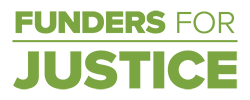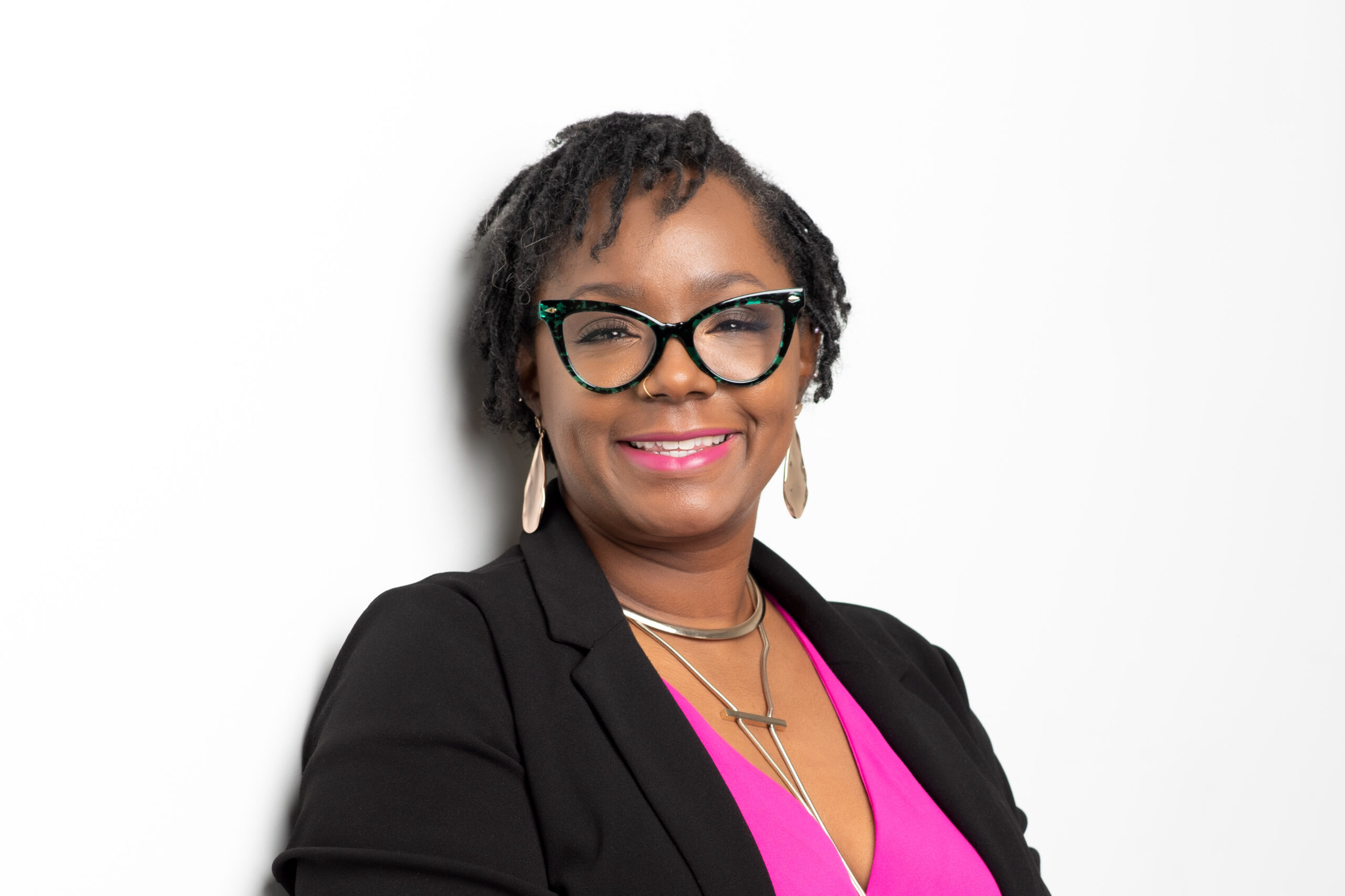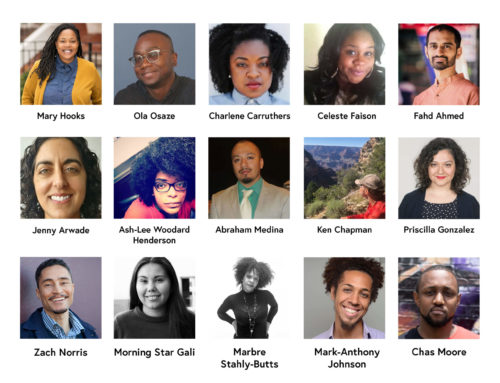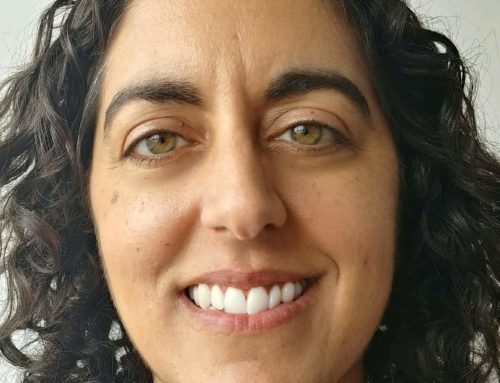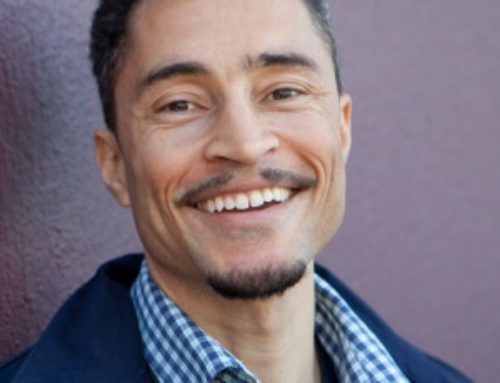FFJ Movement Advisors are thought leaders and partners in our work to support and sustain grassroots movements. Their visions for justice and what is needed from philanthropy provide critical insights to guide our efforts. In their commitment, the FFJ Movement Advisors organize with philanthropy and deepen their relationship with FFJ and its members. They partner with FFJ staff and members to lead profound conversations and offer strategic guidance toward funding practices that support community safety and justice models.
The 2023 FFJ Movement Advisor Interview Series highlights the work of FFJ’s powerful movement advisors and gives you an inside look into the pressing issues that movement leaders are grappling with, the victories they are celebrating, and more importantly, gives you the opportunity to find intersections of interest where you can support and uplift their work as a funder and as an ally.
Get to Know FFJ's Movement Advisors
Markasa Tucker-Harris is the Executive Director of the African American Roundtable (AART), a fiscal project of Social and Environmental Entrepreneurs (SEE). She joined the AART in 2014 as a member while joining the grassroots efforts of Dontre Hamilton’s family. Hamilton was murdered in April 2014 by a Milwaukee police officer. Her grassroots organizing experience aligned her with more deeply engaging with the community and became the co-chair of the African American Roundtable in 2016. After helping to develop an initial platform of work for AART and funding opportunities, she was promoted to director and in 2021 promoted again to executive director. Her love and passion for people and justice grounds her as she helps to lead the coalition of community leaders and organizations that works to improve civic engagement, with a focus on organizing people to build power. In 2019 she helped co-found the Liberate ME campaign, asking for investment into communities and an equitable city budget. Tucker also has a background in media relations that included working on the assignment desk at WISN and CBS 58 along with her time at 620 WTMJ as a radio producer. She is a former member of the National Association of Black Journalists and served as secretary and president of the Wisconsin Black Media Association. Tucker has her bachelor of arts degree in mass communications from Grambling State University where she graduated Cum Laude and is the president of the GSU Alumni Milwaukee Chapter. She is also the founder of The Alternative, Inc Christian art and community engagement organization. Tucker resides in Milwaukee with her supportive husband Terrell Harris and talented daughter Zoe Isabella.
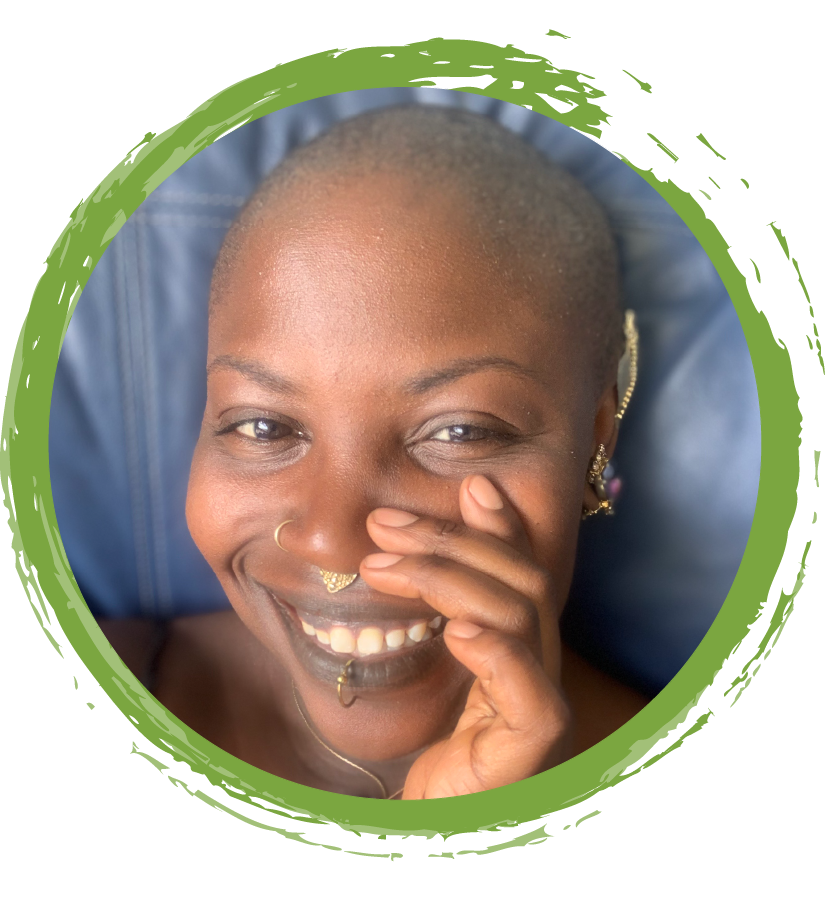
This interview was conducted by Goddess Carroll, Senior Program Associate on June 22, 2023 and has been condensed for clarity.
How do you understand the political moment that we’re in? And what do you think we need to do differently right now?
The juicy first question. So my staff and I have been engaging around Maurice Mitchell’s article talking about organization movement, using it as kind of like a grounding around where we are as an organization, but also the movement.
What an interesting time that we’re in a moment where we have a president, a former president, who was indicted, but also is trying to run for president again. Like, what kind of world do we live in where that is okay, acceptable ,or even allowed, but also cheered on by people? So for me, it’s a lot of micro work that I hope multiplies, expands, vibrates to macro levels to build the people, the community, the organizations, the containers that hold us to continue to push back on all of the violence in the midst, that continues to happen.
Not just self care, but self work. How are we able to show up and be resilient to be in these, these bigger pieces of the movement landscape?
And then another thing is how we build an infrastructure to hold the people and hold the work for these very turbulent times, and violent times that we’re in. And so we build very, very slowly. And with that slow build is a lot of consensus building, which will slow it down even more, and we’re fine with slowing it down. Although the times in the thing are very urgent for us to respond to, we can’t respond well, if we’re not taking time to rest and be creative, create space for creativity and innovation. And so with that, it’s a slower build, slower move, but also building pieces that are going to hold that together. So for us, we took some time to define our values. As a staff, we learned in 2020 that our coalition work is hard, but also the pandemic just really highlighted what it looked like to be in coalition and be in spaces with other black folks who were also going through multiple pandemics and doing, you know, voter turnout electoral work, organizing mutual aid, but we had to better define our values, which hold the bigger infrastructure for us in regards to like, who are we in close community with? Who are we in close coalition with? And then what does that look like in our bigger pieces of work? And we learned we can’t work with everybody. We love Black and Brown people, but we can’t work so closely with everyone because everybody’s values aren’t there. And that’s fine. That’s cool. We still love you. But we know that our work could be staggered, or it could be harmed if we’re working alongside people who are maybe not doing that self work, right? Who don’t take accountability and transformation as seriously as we do. And so for us building a strong infrastructure with defined values, but also with a greater sense of who we are because of those values and how we move together as community supports. And I think that is why we’re doing this work on these micro levels. I pray It’s my hope that we can show up better in the bigger ecosystems of community building organizing and such, because we know that the stakes are so high in regards to all of the things that are coming against us, right.? One thing that we struggle with is the electoral work that we have to balance between the community organizing work that we do in the foundations and the work and you know, the pressure that is put upon us because we have to get the money from the funders and and they struggle us around electoral work and electoral work is not going to free us, and how do they not support organizing work and base building a year round civic engagement, to really build a base of movement of people that is going to move the world forward. So for me, it’s a lot of micro work that I hope multiplies, expands, vibrates to micro levels to build the people, the community, the organizations, the containers that hold us to continue to push back on all of the violence in the midst, that continues to happen. And I think that we are not going to win if we don’t build the sturdy foundation, to hold us and to expand our bases to fight back on all the things that are against us.
So what are some key actions happening in your local community that you think folks across the country should be watching?
So, we have been fighting for participatory budgeting in our city budget since 2019. So before George Flloyd, before our beautiful Breanna Taylor, we’ve been fighting to say, you know, we have to divest from police and invest into community. And so with that, during 2019, the common council was like, oh, yeah, that’s a great idea, then it was 2020 – Oh, yeah, we’re gonna do it, you know, and then its, we’re actually going to do it in 2021 – nobody supported, everybody disappeared, right. And so we said last year, that we were going to put our money where our mouth is. And so we decided to use $40,000 of our own money, general operating money, to support a participatory budgeting process. And so we developed a resident led steering committee, and we just recently launched our application, where we are supporting organizations or agencies up to $10,000. Like, we’re not going to wait on the city to give us money, we’re going to show them what it looks like to put that money out there for the community and let them be decision makers of what that looks like. So that’s one big thing that we’re super excited about launching, a community safety based program on the far northwest side.
I would also say, something that’s been exciting that we’ve been raising awareness around is our city budget just as a whole. So when I started organizing around the city budget in 2018, there was little to no people who were actually involved and/or knew about the city budget.
People knew that, you know, the city budget paid for, you know, services, you know, garbage pickup, snow plowing, but nobody knew, like how that process works. And so we began to organize around it in 2019. And so we’ve raised all of this awareness, we’ve had billboards up, bus ads, and people are starting to take notice. And so now, there isn’t this silo of the common council making all these decisions by themselves, the community is involved. But what’s really exciting for us is we did a three-year strategic plan. And we are actually preparing to give the Liberate MKE, our invest, divest campaign over to our community for them to lead. And so we just announced who those fellows are, who are going to start that process. We did used to do like a cohort for like six weeks and just like build the skills of the fellows, but this year, we said we’re going to start getting them from the start of our cohort, which was in March all the way through the end of the budget cycle in November, and we’re going to begin to give them the keys. It creates space for us to make a new campaign alongside our membership to build a new safety campaign for our northwest side. And then I will also say, like, there’s a smaller organization called Metcalfe Community Bridges, and they have been doing some amazing work in their community. They work specifically on several blocks within their community and there’s only a couple blocks that they work in and they have been building for years with their leaders. They just recently launched their mutual aid program during 2020, they also have a community shed, and they’re just doing some really amazing work. They just recently bought some houses in the community to support a housing program where residents can come back and buy the houses through a housing program that they’re putting together. So there’s some really awesome things happening, we don’t have a lot of Black-led community organizing groups with such a firm foundation as organizations like Metcalfe, and also like the roundtable. And then of course, we have some other folks who are doing some amazing work with young people, Leaders Igniting Transformation, constantly pushing back on cops being in school constantly pushing back on how and how and what it looks like to create space for young leaders in schools and high schools more recently, and on college campuses. So those are some of the things I think locally that I’m most excited about.
I love the way you answer these questions. There’s something about it that’s very generative, like naming the things y’all are working on while also really celebrating and what y’all have done, and then that there’s blessings. And those like you know, those lessons. So can you tell us more about Northwest Side Stories and how storytelling has strengthened Milwaukee’s Black Northwest Side Community?
Yeah, so this was a beautiful offering from our Community Program Manager Ryeshia Farmer and our Digital Organizer Jordan Terry. A lot of times, our organizations do a lot of basebuilding in the central city. And we decided that the central city is not the only place where Black people live. And so we decided to go somewhere where it was not as saturated with organizing and we wanted to create space for leaders to grow and develop alongside us on the far Northwest Side. These are places that are away from the suburbs here in Milwaukee. And so, there’s been a lot of divestment, lots of gentrification. We took that as an opportunity, not like a loss for the Northwest Side, but an opportunity for us to grow and develop something together. And so to engage with the residents in these two districts we were working in, they launched the Northwest Side Stories – to tell stories about what amazing things are happening.
Because when people see the northwest side, they see, like I said, a lot of divestment, they see a lack of opportunity, they don’t see the jewels. And we’re using these stories to lift up the amazing work that people are doing, the amazing people that are there. We have been sharing these stories through our YouTube page that we’re just recently developing and launching. We don’t have a lot of followers, but we have some, and it is growing!
What we normally ask folks to do is, if we interview you, to share with your people. And so it’s creating awareness for people around what is actually happening on the Northwest side. Just recently, we interviewed someone who is doing soccer with young people, that’s not an opportunity that young black kids get on the far Northwest side. That’s exciting to bring that information out.
There’s a Black caterer that we’re working with, they own a restaurant, and we’re getting ready to do a block party with them that’s gonna bring more awareness to their business, and also to that community. And to us as well. We also interviewed my mom! My mom has lived in the far Northwest side, pretty much all my life. I’m 44 years old and they’ve been there since before I was born in the early 70s. I’ve got hear her story, but also, us engaging her has now brought her in and up our leadership engagement ladder, she’s now also a part of the participatory budgeting resident led steering committee. So not only is it raising awareness to what is happening on the Northwest side, and who’s on the Northwest side, it is deeply engaging people in our work and bringing them in.
The lady who I was just mentioning, who owns a catering business and the restaurant, she just was out helping us organize and talk to people about the sheer revenue issue that we’re dealing with in the state at our Juneteenth canvassing event. So just amazing, not only again, it’s twofold, where people are learning more about the Northwest side, but it is also helping us to build our base of people and move people up the ladder of engagement.
How does your work connect to a vision for change in the communities that you work in?
We just created a new mission and a vision statement, and I want to share that with you because I think that the work that we are doing is meeting the moment. So our new mission is: the African American Roundtable organizes, nurtures and transforms Black leaders to build power in service of Black liberation. And our vision is: AART is a joyful, political home for Black people to thrive in liberated, interconnected communities. And so, again, some of the work that we’re doing, whether it’s on self-work, slow decision making, slow building, you know, living deeply in our values, holding each other well, and accountability, transforming alongside of each other, learning from our mistakes, sharing that and being transparent with our community around what that looks like, and also, creating space for us to just be we are learning to practice risk.
And if we don’t practice it now, my daughter and our children will not practice it, and people will be exhausted and or will not make it to Freedom land. And we want people to do that. And so when we lean into all of those things, I think that we can create that joyful political home that Black people deserve here in the City of Milwaukee.
I know that one of AARTs vision is for Black people to thrive in liberated, interconnected communities; can you share more about why this is pivotal to the health of our people, and why it needs to be named specifically?
Yeah. So we know that nothing is possible without an interconnected community, an intergenerational community, like, you know, all identities of Black people being connected, to build the world that we want to live in. We can’t do it in silos, and we can’t do it alone. Like I said, our values may shift and change, [but] there’s a point of intersection and connections that we know will bring us to the point of liberation.
We’ve learned that those beautiful spaces that we create, together with young people, elders, middle aged folks, and again, representing all the different identities of Black people, are the most joyful spaces and where there is joy, there is health, and where there is health, there is healing. And when there is healing, there’s opportunity. Where there’s opportunity, there is freedom. We have experienced that for ourselves. And so we wanted to name explicitly that, in order for us to build these thriving communities and to get to freedom schools, we have to have interconnected communities. We cannot say that we’re going to build a freedom school and not include the baby. We can’t say that we’re going to build a freedom school and not include Trans folks. We cannot say that we’re going to build freedom schools, and not include our elders. So we think that it is detrimental to the work that we’re doing, if we do not create these spaces where all Black folks can be together and to build the world that we want to live in.
What do you want funders to better understand about the work to do?
Just give us the money, and we’ll know what to do with it. Okay, just give us the money. Don’t restrict that money. Give it to us, we’ll show you a plan. And then, guess what? that plan may change.
Be flexible, be pliable, be like water, because that’s how we have to be, we have to be like water. But then we have to come back to you with these rigid and strict, you know, guidelines, it restricts the work that we get to do and it puts more pressure and stress.
And I’m not trying to live in any stress because of no funder, I don’t want to live in stress because of anything that I do, let alone someone who has power over me, you know, to tell me what to do and when to do it and how to do it. So I need them to just give us money without restrictions. Trust us, be like water, be flexible, as we have to be flexible, and create and be more open to the ideas that we present. And let it be multi-year! We can’t keep doing this year-by-year thing of: “give us another budget, and tell us how you did that.”
Everything is often not quantifiable in the way that they see it. So when I tell a story, don’t ask me for 50 million numbers, don’t ask me for 50 million metrics. Hear the deep work around relationships, hear the deep work around the slow building that we’re doing, hear and see the deep work that we’re doing that has taken us this far because of years and generations and decades of oppression and all the systemic things that we were dealing with. Don’t expect me to push out something in a report over a year and say, “Well, what did you accomplish? What did you do?”
No, I need you to be along this ride for years to come to support the slow build and the slow work that we have to do to undo all the things that have been done. We’re trying to undo big things, big things. And we don’t need to be rushed in doing so either.
Can you share your insights on what it takes to develop sustainable, powerful leadership at the helm of the social justice movement and how can funders support this?
I think about it from my own personal journey. The first thing I have to do is give grace, you know, give myself grace, I have to give myself the gift of grace.
Because this world is hard. And this work is hard, and I am a human who is flawed. You know what I’m saying? As a leader, I’m not going to make all the right decisions. I’m not going to do all the right things. I’m not going to say all the right things. So I would offer myself grace, one.
Two, wise counsel. Be surrounded with some wise counsel do not lean on your own understanding whether it’s God or faith or people, what is the wise counsel that’s supporting you, so that you don’t feel like as a leader, you’re on this island by yourself doing all of these things by yourself, which can cause burnout, which can cause depression, which can cause isolation, all of these things. Is something that has been very pivotal to my leadership. I will also say, unlearning, what is causing you not to trust yourself. What is it that is not allowing you to lean into the brilliance that God has put inside of you?
Like, we are divine human beings, we have the most amazing blueprint, you know, of God as our Creator. And so, I would say to unlearn those things that cause you not to trust and lean into your own brilliance. And then once you find those things out, like get rid of them! Create boundaries, make space, so that you’re not going back. And it’s not, you know, we do not have a lifelong learning practice, none of us learn these things overnight, but being very clear about what those things are. And again, sharing that with someone else on your journey who can help you and support you and say, like, I see you getting better. I see you saying no, I see you doing this thing. I see you working in a new practice.
I would also say if you can afford it, get a coach, get a coach. So not just for wise counsel, but to support you on this journey. We should not be leaders doing this work alone, there’s so so many brilliant leaders throughout the movement, like either offer yourself to someone as maybe a coach or someone who can support and mentor somebody, and then also allow yourself to be coached.
When I went from office manager, to grassroots organizer, to director, to ED, I had a woman, a Black woman who I worked under, for probably about a year or so who I took in a lot of learning from her and how she lived. But no one, I could say, that told me, “Hey, Markasa, let me coach you into this next season of your life.” So what I’ve learned is, it is so important to coach up other leaders, whether it’s a lead organizer, whether it is an office manager, we need to be coaching up the next level of leaders and ensuring that we’re creating a leadership pipeline. That is indicative of the work that we’re doing in order for me to sit down one day. I’m going to have to sit down and so if I haven’t trained up another leader or people that are working alongside of me, how is the work going to continue to go on?
Absolutely. So what does this look like in terms of funders? Like how can we support that because like you said, like a lot of the work we do is not quantifiable and includes like our leadership development. So what does that look like for funders?
Thank you for asking. Fund coaches, fund people to get coaches and leadership development. Fund people to take sabbaticals. Fund people to take time to build strategic plans. And fund and support by listening, you know what I’m saying? So if you are thinking about launching a new initiative, why don’t you bring in the people that you’re funding to offer some suggestions and some feedback?
if you want us to say, okay, and believe in the programming that the different initiatives that you guys are launching to give us money for – Why not ask the experts? Why just continue to depend on your own, whatever, you know, which is very limiting. So I would say those things, fund coaches, fund sabbaticals, fund training and development for people, and listen and create space to hear from folks, the experts who are doing the work.
Yes. So this next question is a dreamer question because I love to dream. So what do you envision your community looking like in 10 years? And what are three integral steps you believe will bring this into existence?
I was just writing a grant, so I know, that’s 2033.
I definitely see more leadership that looks like progressive folks, real progressive folks, people who are not going in and selling out, and I’m not saying, I believe in the system around, you know, common council may or like all of those governmental structures, but I know that is a peak along the journey, that we have to have people who are in office that are going to support the things that we’re looking to win our campaign. And so I see the governmental leadership on the local level, and maybe the county level, and maybe even the state level, like really making a real shift, and looking more like the folks on the ground.
I also see a plethora of opportunities for young people. We have, you know, beautiful babies, beautiful young people who are literally dying for an opportunity. There’s situations that they are being put in that are causing them to make decisions that are not helpful, but harmful. So we know that more opportunities would bring life, health and healing. So I see more places like when I was growing up, it may be you know, more innovative, but we had like, go-karts, min-golf, water parks, you know, right in the community, whether it’s splash pads or swimming pools, but I see more of those things come back into the community, with young people leading with those things, so it’s not just adults creating these spaces. I see more opportunities for young people. I see our Freedom School thriving. I see Northwest Side residents that we’ve been working with for years, leading those spaces and classrooms, teaching people how to cook and about finances and about growing their own food. Teaching kids about money and reading, and different languages.
What else do I smell and see? I don’t see myself at the roundtable anymore. Maybe I’m advising, I’m spending time with my family, my husband, I’m traveling, I’m offering my voice, my gifts.
Me and my husband, we’re able to grant black people in Black businesses money and we’re helping them to start up their businesses. That’s one thing that we definitely want to do.
I see myself owning my own community space that is open to people to build their dreams, to learn more, to grow more by just being in space. Whether people need to rent a meeting, whether people want a baby shower, people want to hang out, we watch a fight, you know, whatever entertainment or a space that Black people need – I want to be able to provide it for them.
I will also say I see a more organized Black community, you know, of being more united around the things that we want and not so much division in different agendas and egos and pride. I see a lot of that stuff has died. And it’s made space for the growth of something beautiful: humility and compassion and love and a lot of joy. Because they know that when some of those other things die, it creates space for us to grow the way that we want and to build the way that we want to get some of these other things that we see.
What are three integral steps you believe will bring the vision into existence?
Thanks for reminding me of that. Black people who have access to capital, to funds, to land, to property – to help fund this dream.
I’m saying to help fund it. It’s going to take them knowing that they have to help to build the Milwaukee that we want, the county that we want, the state that we want.
It’s going to take grassroots organizers, we’re going to have to create space to develop the leaders that we want to be in office. And so maybe some people gotta launch some C4’s so they can create this space that’s needed.
So yeah, we have to know whether, like I said, somebody is launching a C4 – we have to build the pipeline for people to get in office to help to do the work on the inside, while others are doing the work on the outside. And the third thing would be, we have to lean into loving and supporting each other, and finding ways to not be so busy with meetings or our own agenda and find a way to come together, honestly. We have to lean into loving and supporting each other. We have nothing to lose but our chains.
What fuels your commitment to be an FFJ movement advisor this year? And how has FFJ supported you?
The opportunity to be a part of something on the other side of my work that is going to help the bigger picture of our work.
So, what an amazing opportunity to help to build leaders and organize but also to support whatwe need to fuel the work that we’re doing.
To be a voice and to be alongside some of the brilliant people that we’ve had an opportunity to connect with like Charlene Carruthers, that’s a blessing, that’s a blessing. So I don’t take these opportunities and the gifts of people very lightly.
And so just really thankful to be a thought partner, but also to think strategically creatively and innovatively to support the work on the opposite side of what it is that I’m doing, if so many other organizations across the states are doing and will do the other part of the question.
But yeah, I would just say like, bring me into these brilliant spaces, like the space with [Third Wave Fund] a couple of weeks ago was so juicy, it was so beautiful. So I would say just giving me access to other organizations, other organizers, other leaders across the states has been an amazing gift within itself, and also how sweet it is to get lunch to support our space!
I also appreciate you all just being willing, you know, I don’t think you guys would do anything less – but to create the space of what is needed. So I love those lunch chats. The questions are just simply like, you know, what’s going on, like, what do you want to talk about? What do you need, you know, when people want to talk about safety, you know? Then feeling from there and being very generative around like how you create topics and space and say, okay, well we’re gonna pivot this way. Okay, we’re gonna pivot that way to support what folks need outside of just the work that you all want to accomplish.
So I appreciate the space, the people that we’re able to build alongside and the opportunities that we get to engage with people and the work that’s happening across the states. It’s been beautiful.
Last question, are there any resources you find helpful when centering your work, and why?
Both Black Organizing Leadership and Dignity – those are my people they’ve helped build me.
I love anything and everything adrienne marie brown, Emergent strategy. Anything and all things Mariame Kaba. Yeah, those are those are my main people and sources that I lean heavily into when I need support, help, direction.
Oh, yeah, and The Management Center. Let me let me not lie, they got all the tools. I don’t have to build my check-ins, I don’t have to build the project management pieces. I don’t have to do any of that. And then I will have to give love to my coach Jennifer Epps Addison, who used to be a part of Center for Popular Democracy and has recently become a consultant, and she’s now my coach. She’s also someone I’ve been able to lean on. Also Alexis Anderson Reed, who helped to build my leadership. She’s, I think, the CEO at State Voices. So those people, those resources, those things have been my go to and I’m sure there is a ton more you know, but those, oh! – and my faith honestly. My faith is what grounds me and keeps me if nothing else, my faith and my family ground and keep me.
